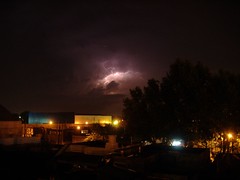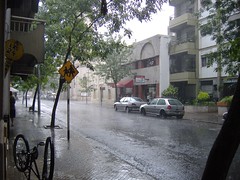As promised yesterday, I'm going to explain why I think that the decission of the Supreme Court about the pesoification of dollar-denominated frozen bank accounts was the right thing to do. But first, a note...
We Argentinians are like those insecure types that mask their distress by posing as overconfident. To the outsiders, Argentina is the greatest country in the world, our women are the most beautiful, our football team is invincible, Maradona is God, our beef is the very tastiest, the Pampas are the Granary of the World, and we're the friendliest, warmest bunch of folks on the face of the Earth. We don't take outsiders' criticism very well. Yet when discussing our country among ourselves, all conversations eventually conclude that Argentina is and will ever be un país de mierda.
 On the same line, we like to ramble about our nationalism, our love for own land, the need for all citizens to truly support Argentina and be passionate about it, as in the top countries. Then we turn and continue screwing up the country by voting for notoriously corrupt politicians, by selling our national resources to foreign corporate predators, or by taking all our savings, exchanging them for a foreign currency, and sending them abroad to live off interest, instead of investing it here.
On the same line, we like to ramble about our nationalism, our love for own land, the need for all citizens to truly support Argentina and be passionate about it, as in the top countries. Then we turn and continue screwing up the country by voting for notoriously corrupt politicians, by selling our national resources to foreign corporate predators, or by taking all our savings, exchanging them for a foreign currency, and sending them abroad to live off interest, instead of investing it here.
Regarding the last point, most Argentinians will tell you that amassing dollars has historically been a good idea because our shitty economy keeps crashing every decade, and it's a bad idea to trust that Argentina will reward your work and your investment in any way.
Such point of view is self-defeating, and such previous assumptions of doom are obviously self-fulfilling; how can an economy be stable when everybody's hoping it'll explode any time? Even as most Argentinians danced at the tune of Convertibility Era, where one peso equaled one peso by law, they continued keeping their savings in dollars, and many had offshore accounts.
When you have to give US$1 to anyone who approaches you with AR$1, you'd better have a lot of US$. You'd better make sure that you export more than you import, and that you have enough extra bucks to pay your foreign debt installments. And you should have some way to control what happens when outside influences rock the dollar.
Argentine foreign trade, 1992–2004
(in millions of USD)

Argentina tended to import more than it exported, borrowed a lot of dollars, and privatized utilities that were actually profitable. Its monetary policy was basically controlled by the U.S. Federal Reserve. When the Fed raised interest rates, speculative money flowed into the U.S. and out of the developing world. When the dollar revalued internationally, Argentine exports became even less competitive. When Brazil devalued its currency, it became worse, and multinational business moved there because it was cheaper. When
East Asia,
Mexico or Russia had a financial crisis, investors fled developing countries. Argentina could not do anything but try to amass dollars to act as a shield. In the rigid context of the Convertibility Law, money simply could not be generated internally; if you needed more pesos in circulation, you needed to have more dollars in the Central Bank's reserves. There were two ways to get dollars: the good one, by exporting more; the bad one, by borrowing. So that we could export more, the government of Carlos Menem opened up international trade so companies could buy shiny foreign machines without tariffs, and crushed the spirit of labour laws so companies became more competitive. Of course, this killed whole sectors of the economy that couldn't cope with an invasion of cheap imports, and sent millions of people to permanent unemployment or precarious jobs. Companies doubled their exports, but imports grew as well, and tourism sent more dollars abroad too — for all our talk of the beauty of our country, Argentinians chose to grace the beaches of Punta del Este and Cancún, to celebrate their daughters' 15th birthdays with a trip to Miami, and to tour the fashionable places of Europe, where they felt more at home than in poor dirty Latin America. It was cheaper to go to a Caribbean resort than to visit the Iguazú Falls, and it was also cheaper to buy Greek peaches and German recordable CDs than to grow our own peaches or manufacture our own CDs.

When a series of crises hit the world economy, we were utterly unprepared. We could've saved ourselves; the solution was to set up strong controls on the movements of foreign currency and speculative investment across the border, start a process of import substitution, and devalue the peso gradually. Our politicians decided they'd let us live our dellusion for as long as possible, though, since devaluation meant inflation and it was political suicide even to suggest it. Moreover, why do it, if the IMF kept telling us it was OK and showing off Argentina to the world as the best example of a modernized neoliberal economy?
When it became obvious that we wouldn't be able to pay our foreign debt, cautious people started taking dollars out of the country. Those who could bought dollars to have a reserve of strong currency in case of a devaluation. This only put more pressure on the Central Bank. Domingo Cavallo, our hyperactive Economy Minister, froze all bank accounts, so that nobody could withdraw but 250 pesos a week. That was much more money then that it is now; I earned about 400 pesos a month. Then came
the food riots,
the popular revolt, the president's resignation, and the new president Eduardo Duhalde. Duhalde knew he had to devalue the peso. He decreed that dollar-denominated accounts would be pesoified — nobody would get actual dollars anymore; if you wanted your money, you would get pesos at the rate of 1.4 per dollar, the new official exchange rate. Soon the dollar was floated freely, and the rate climbed to two, three, almost four pesos to the dollar in a matter of months, as inflation surged. Suddenly those Greek peaches were not so cheap, and those German CDs were costing 4 times as much as before. Gloomy forecasts were made: the rate would climb to 10 pesos per dollar, Argentina would default and be isolated from the rest of the world in shameful humiliation.
Why did this not happen? Because people's money was trapped in the banks, and because the currency speculation game didn't work. Under the usual scenario, people would wait for the exchange rate to be high enough, then take their dollars out and sell them for pesos, getting 3 times as much as they had put in the bank minus inflation, and royally screwing the rest of us — since all those pesos would fuel a huge inflation. People would also buy more dollars, knowing that the rate would climb even higher, and take them to a safer place.
What happened was that angry savings holders forgot their middle-class manners and
assaulted the banks, breaking their windows, spraying their facade with paint, and setting fire to tires before their doors, as well as deploying armies of lawyers against the banks themselves and the government. I can't blame them for being furious; we're talking about the savings of their whole lives, sometimes savings they needed to pay for a house or a car they'd just bought, for a self-imposed exile in Spain or Italy, or even for an expensive heart surgery. What I remember resenting, and resent even now, is how they seemingly forgot that they'd brought it upon themselves, and that (for most) their plight was nothing compared to the ever-worsening hell of their poorer compatriots. Maybe 500,000 people had significant dollar savings in Argentina — they were privileged, the top 1% of the population. Yesterday I heard on TV a savings holder that complained about the lack of support of the rest of society — it sounded exactly like "How come you pity and subsidize the poor and the unemployed and you don't help us getting back our billions in strong currency?". My dear compatriots, forgive me if I can't muster any
pity for you.
This is undoubtedly (and unashamedly) my own biased opinion, formed through years of suffering, and seeing my family suffer, under an economic model that worked only for the rich. Abstractly I know they didn't
deserve to have their savings confiscated and plundered. Maybe it would've been the same if they'd decided to invest their money in their own country or keep it in their own currency, to demand their government to get things straight, and to think carefully that maybe they were supporting a policy that would lead us all to disaster..., or maybe it would've been different. We'll never know.
Do we ever learn from our mistakes? Let's hope that at least.




























